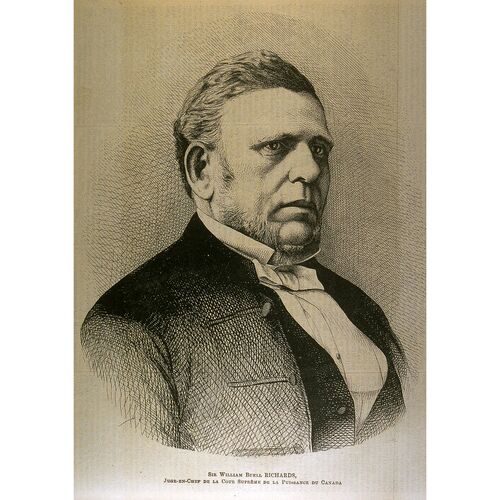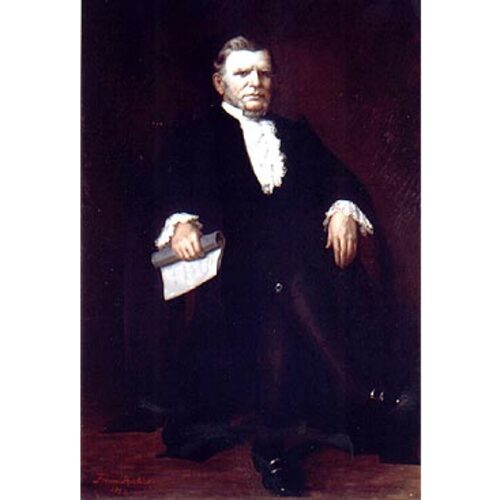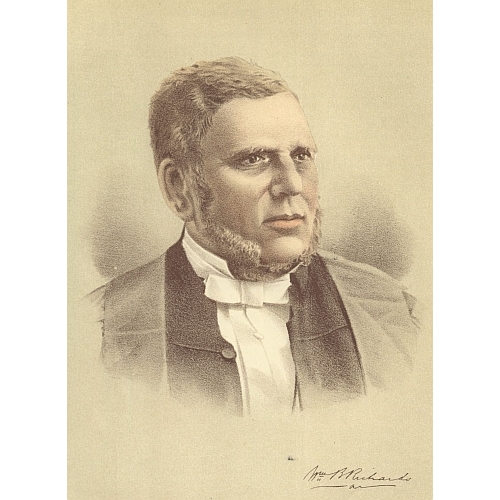RICHARDS, Sir WILLIAM BUELL, lawyer, politician, and judge; b. 2 May 1815 in Brockville, Upper Canada, the eldest son of Stephen Richards and Phoebe Buell, and brother of Stephen and Albert Norton; m. 19 Oct. 1846 Deborah Catherine Muirhead (d. 1869), and they had three sons and two daughters; d. 26 Jan. 1889 in Ottawa, Ont.
William Buell Richards was educated at the Johnstown District Grammar School in Brockville and the St Lawrence Academy in Potsdam, N.Y. After serving in the Brockville law offices of both his uncle, Andrew Norton Buell*, and George Malloch, he was called to the bar in 1837. He practised in partnership first with Malloch, and then after 1842 with Buell, thereby cementing the close relationship which already existed between the Buell and Richards families. In 1849 he became a bencher of the Law Society of Upper Canada and he was named a qc the following year.
As a young man Richards was active in a number of community organizations, including the Brockville Mechanics’ Institute, a debating society, a lending library, the town council, agricultural societies, and numerous social clubs. Following the strong tradition of the Buells and the Richards, he was also an ardent Reformer. Throughout the 1840s he helped to revitalize the Reformers especially in the rural areas of Leeds where he became popular among older, established families and the recently arrived Irish Roman Catholics. In 1844 he was nominated to contest the constituency of Leeds in the general election, but he retired in favour of William Buell*, his uncle. Nominated again for the election of 1848, he defeated the arch-villain of Reformers in Leeds, Ogle Robert Gowan*; this victory was particularly satisfying because during the election campaign Gowan had questioned Richards’ loyalty in the 1837–38 rebellion. Once elected, Richards became involved in the distribution of patronage to the long-ostracized Reformers of eastern Upper Canada, an activity he believed fully justifiable, even necessary.
A close friend of Robert Baldwin*, who was godfather to one of his children, Richards rose rapidly in the Reform administration. In 1851, after he again defeated Gowan, he was appointed attorney general in the administration of Francis Hincks and Augustin-Norbert Morin*. In office, Richards displayed an interest in legal reform by promoting the reorganization of statute law and by helping to raise the requirements for admission to the bar. On 22 June 1853, amid considerable controversy because of what some claimed to have been a brief and undistinguished legal career, he was appointed a puisne judge of the Court of Common Pleas. Yet although political influence had helped Richards obtain the judgeship, he was, despite the protests, well qualified for the post. He became chief justice of that court on 22 July 1863.
As a judge Richards was widely acclaimed as “a man of large common sense” rather than as a brilliant jurist. He was also known for his wit, which he used especially to embarrass pompous lawyers. During the 1850s and 1860s Richards visited all regions of Canada West, holding spring and fall assizes in county towns. Because of his early experiences in Leeds County and his practical approach to the law, he became a popular judge whose decisions were seldom appealed. He heard a wide variety of cases involving boundary disputes, libel, testate questions, paternity suits, seduction charges, bad debts, and occasionally manslaughter and murder. Richards maintained detailed case-books that reported both on the evidence and on his own impressions of witnesses. No doubt this thoroughness was an important reason for his success as a judge and it helps to explain why he was appointed chief justice of Ontario’s Court of Queen’s Bench on 16 Nov. 1868.
Richards was involved in several well-known cases of the time. In 1858, along with William Henry Draper*, he had rendered a controversial decision in favour of the government of George-Étienne Cartier* and John A. Macdonald* over the “double shuffle” incident. He presided at the trial in 1868 of Patrick James Whelan*, charged with the assassination of Thomas D’Arcy McGee*, a trial marred by questionable procedure; Richards did not enhance his reputation when, after his appointment as chief justice, he sat in judgement on the appeal. In November 1874, trying a controverted election case in Kingston, he found Macdonald’s campaign associates guilty of bribery, and the next month Macdonald was obliged to contest the seat in a by-election which he won by a narrow margin.
Richards also took part in early discussions concerning the creation of a supreme court for Canada, and in 1871 visited judges of the Supreme Court of the United States in Washington to evaluate the effectiveness of that court. When Alexander Mackenzie*’s government established the Supreme Court of Canada in 1875, Richards was a popular choice among Liberals and even among many Conservatives for the chief justiceship.
Richards’ tenure as chief justice from 8 Oct. 1875 to 9 Jan. 1879 was characterized by controversy in parliament and in the press largely because of the contention surrounding the establishment of the court itself. Many Conservatives and a few Liberals who were strongly opposed to the Supreme Court objected to the high cost of the court and its isolation in Ottawa, as well as to its slowness in coming to decisions and to the poor reports that were made of the initial cases. They also pointed to the alleged nepotism of Justice Jean-Thomas Taschereau* and to the absenteeism of judges, including Richards himself who was often abroad studying court systems. These were politically inspired debates, and during the first years of the Supreme Court Richards and his fellow justices, especially William Alexander Henry, were also confronted with the difficult task of establishing the court’s role within the judicial system. A staunch defender of the court, he attempted to strengthen it while keeping it separate from the legislative arm of the federal government. As well as developing the court’s early rules of order, he also dealt with questions concerning the right of appeal, the minimum worth of property cases heard before the court, and its relationship with the Judicial Committee of the Privy Council. He was particularly interested in the use of the court as an arbiter of dominion-provincial relations and his tours of Europe and the United States were to determine how other courts dealt with similar problems.
Late in his career Richards received several other appointments. From 1874 to 1876 he acted for Ontario on the arbitration committee established to settle the Ontario-Manitoba boundary dispute. He was created a knight bachelor in 1877 and was designated deputy governor general in the absence of Lord Dufferin [Blackwood*]. Despite a personal friendship with Sir John A. Macdonald which had begun in the 1860s, the prime minister and his associates pressed Richards to resign in January 1879, probably because of ill health. After his retirement he travelled widely, maintaining residences in France, Ottawa, and Toronto until he died of asthma in 1889.
AO, MU 301–9. MTL, Robert Baldwin papers; William Warren Baldwin papers. PAC, MG 24, B75. Canada Law Journal, new ser., 25 (1889): 194–96. Reports of the Supreme Court of Canada, comp. George Duval et al. (64v., Ottawa, 1878–1923), I–II. Brockville Recorder (Brockville, [Ont.]), 1830–49. Canadian biog. dict., I: 9–10. CPC, 1876. Dent, Canadian portrait gallery, I: 212–13. T. W. H. Leavitt, History of Leeds and Grenville, Ontario, from 1749 to 1879 . . . (Brockville, 1879; repr. Belleville, Ont., 1972). G. R. I. MacPherson, “The code of Brockville’s Buells, 1830–1849”
Cite This Article
Ian MacPherson, “RICHARDS, Sir WILLIAM BUELL,” in Dictionary of Canadian Biography, vol. 11, University of Toronto/Université Laval, 2003–, accessed March 1, 2026, https://www.biographi.ca/en/bio/richards_william_buell_11E.html.
The citation above shows the format for footnotes and endnotes according to the Chicago manual of style (16th edition). Information to be used in other citation formats:
| Permalink: | https://www.biographi.ca/en/bio/richards_william_buell_11E.html |
| Author of Article: | Ian MacPherson |
| Title of Article: | RICHARDS, Sir WILLIAM BUELL |
| Publication Name: | Dictionary of Canadian Biography, vol. 11 |
| Publisher: | University of Toronto/Université Laval |
| Year of publication: | 1982 |
| Year of revision: | 1982 |
| Access Date: | March 1, 2026 |


![Sir William Buell Richards, juge-en-chef de la Cour suprême de la puissance du Canada [image fixe] Original title: Sir William Buell Richards, juge-en-chef de la Cour suprême de la puissance du Canada [image fixe]](/bioimages/w600.4997.jpg)



